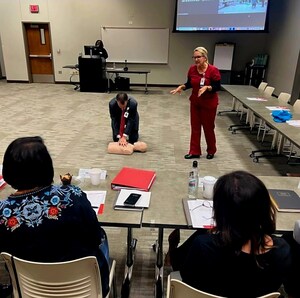Study Highlights:
- A mother’s stroke history can help predict her daughter’s risk of heart attack.
- Family history of stroke may be as useful as family history of heart attack in gauging heart attack risk.
DALLAS, Feb. 1, 2011 /PRNewswire-USNewswire/ -- If you're a woman and your mother had a stroke, you may have a risk of heart attack in addition to a higher risk of stroke, according to new research on family history and heart disease published in the American Heart Association journal Circulation: Cardiovascular Genetics.
(Logo: http://photos.prnewswire.com/prnh/20100222/AHSALOGO)
In a study of more than 2,200 patients, female heart patients were more likely to have mothers who had suffered a stroke than fathers who did.
"Our study results point towards sex-specific heritability of vascular disease across different arterial territories — namely coronary and cerebral artery territories," said Amitava Banerjee, M.R.C.P., M.P.H., the study's lead author and Clinical Research Associate in the Stroke Prevention Research Unit at the University of Oxford in the United Kingdom.
The Oxford Vascular Study included patients who had suffered a stroke or transient ischemic attack (TIA), or had experienced a heart attack or chest pain known as unstable angina. It's the first study in which researchers investigated the link between a relative's stroke and heart disease risk by sex of the patient and sex of the relative.
In a previous study of the same group, researchers found that women face a higher risk of heart attack before age 65 if their mothers have also had a heart attack at an early age. Other research has linked a mother's history of stroke to a daughter's stroke risk.
Understanding such gender-specific risk factors is important because women, despite their lower odds of suffering a heart attack, are more likely than men to die from one, Banerjee said.
"Moreover, traditional risk factors such as high blood pressure, smoking and diabetes don't account for heart attack risk as clearly in women as in men, and tools to gauge risk in women are inadequate," Banerjee said. "There is clearly room for improvement in predicting heart attack risk in women."
The study also found:
- About 24 percent of the heart attack and angina patients, and roughly the same percentage of the stroke patients, had at least one first-degree relative who had a history of stroke. This indicates that stroke history in these relatives — which included siblings and parents — is as important to a person's risk of heart attack or angina as it is to risk of stroke, Banerjee said.
- The female patients who had heart attacks or unstable angina, conditions known collectively as acute coronary syndromes, were more likely to have had any female relative than any male first-degree relatives with stroke history. Male patients were the opposite.
- Parents' stroke history didn't help predict where patients' heart disease showed up on coronary angiography, or whether disease was present in multiple blood vessels. This suggests that whatever family influence is occurring doesn't directly affect the heart's anatomy or dictate where dangerous plaques build up in the coronary arteries. Instead, family history might influence a more general tendency toward thrombosis, or clot production.
The new findings can't be attributed to genetics alone because shared environmental factors such as relatives' wealth or poverty can also influence disease risk, Banerjee said.
The study used multiple avenues to comprehensively identify patients in a six-and-a-half-year period who had a diagnosis of stroke, TIA or acute coronary syndromes.
Researchers gathered data throughout the study rather than retrospectively and the subjects were a more representative group recruited through general practitioners. However, because the subjects are all from the United Kingdom, it's unclear whether the findings would apply to populations in other countries. Ninety-four percent of the population in the Oxford Vascular Study is white, 3 percent Asian, 2 percent Chinese, and 1 percent Afro-Caribbean.
To gather family histories, researchers relied on patients' reports rather than direct interviews with relatives. But studies have shown these reports are generally accurate and are what doctors most often rely on in the clinic.
"Existing tools to predict heart attack risk ignore family history or include it simply as a yes or no question, without accounting for relevant details such as age, sex and type of disease in patients compared with their relatives," Banerjee said. "Family history of cardiovascular disease is under-used in clinical practice."
Co-authors are: Chris C.S. Lim, M.B.B.S.; Louise E. Silver, R.G.N., B.Sc., M.Sc.; Sarah J.V. Welch, R.G.N., B.Sc., M.A.; Adrian P. Banning, M.D.; and Peter M. Rothwell, M.D., Ph.D.
Author disclosures are on the manuscript.
Statements and conclusions of study authors published in American Heart Association scientific journals are solely those of the study authors and do not necessarily reflect the association's policy or position. The association makes no representation or guarantee as to their accuracy or reliability. The association receives funding primarily from individuals; foundations and corporations (including pharmaceutical, device manufacturers and other companies) also make donations and fund specific association programs and events. The association has strict policies to prevent these relationships from influencing the science content. Revenues from pharmaceutical and device corporations are available at www.americanheart.org/corporatefunding. |
|
NR11 – 1028 (CircGenetics/Banerjee)
Additional resources:
- Downloadable stock footage, animation and our image gallery are located at www.heart.org/news under Multimedia.
- For more about preventing stroke visit www.strokeassociation.org, and http://powertoendstroke.org/.
CONTACT: |
|
Maggie Francis (214) 706-1382; [email protected] |
|
Bridgette McNeill: (214) 706-1135; [email protected] |
|
Julie Del Barto (broadcast): (214) 706-1330; [email protected] |
|
SOURCE American Heart Association
WANT YOUR COMPANY'S NEWS FEATURED ON PRNEWSWIRE.COM?
Newsrooms &
Influencers
Digital Media
Outlets
Journalists
Opted In






Share this article